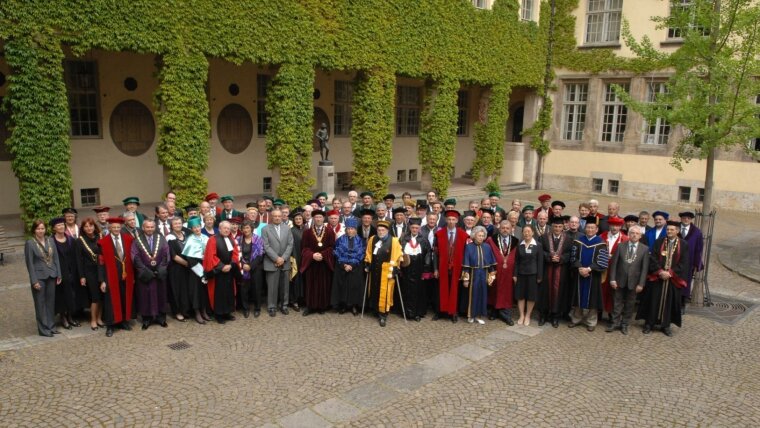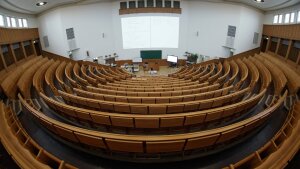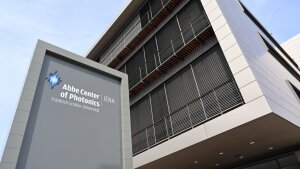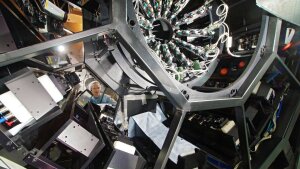
A German university of rich history and tradition
Historical physics lecture hall at the Max-Wien-Platz in Jena.
Image: Jan-Peter Kasper (University of Jena)The Friedrich Schiller University Jena, or "alma mater jenensis" in Latin, is one of the oldest universities in Germany. At the time of its founding in 1558, the subjects of research and teaching were confined to the classical academic areas of philosophy, theology, law and medicine. During the past centuries, many prominent scholars have been professors at this university. During the classic-romantic "miraculous era" at the end of the 18th and the beginning of the 19th century, Jena became famous through the influence of such world-renowned poets and philosophers as Goethe, Schiller, Hegel and Fichte, who further elevated its intellectual atmosphere.
The cradle of modern optics and photonics
Nocturnal lighting show in Jena.
Image: Jan-Peter Kasper (University of Jena)At the beginning of the 20th century, fortunate circumstances led to the historical collaborations that continue to define Jena's academic and industrial position even today. The physicist and professor Ernst Abbe, who developed the theory of image formation in microscopes, the engineer Carl Zeiss, who founded a workshop for optical instruments (now Carl Zeiss AGExternal link) and the chemist Otto Schott, who developed optical glass with tailorable refractive indices and founded the Institute for Glass Technology (now Schott AGExternal link), paved the way for Jena's economic prosperity. This close and fruitful collaboration of applied research and industrial production using state-of-the-art technology is a distinct feature of the Jena area.
At around the same time, Ernst Haeckel, perhaps the most important protagonist of evolutionism second only to Charles Darwin, became a professor at our university and maintained this position for more than 45 years. At the start of the 20th century, the professor of medicine Hans Berger measured an electroencephalogram (EEG) of the human brain for the first time. Last but not least of our famous professors was physicist Max Wien, one of the pioneers of wireless communications, who developed a radio transmitter which was used, for example, on the famous RMS Titanic.
Abbe Center of Photonics
Front facet of the ACP research building.
Image: Jan-Peter Kasper (University of Jena)The Friedrich Schiller University Jena has always enjoyed an excellent reputation for its academic potential. The most striking features of research in Jena are its interdisciplinarity, synergetic networking and innovative approaches. On a national scale, the Faculty of Physics and Astronomy in Jena receives one of the highest research funding sums compared to all physics faculties across Germany. The Abbe Center of Photonics (ACP), founded in 2010, hosts the Abbe School of Photonics and is the key enactor of the profile line LIGHT within the University. As an interfaculty university center, ACP comprises more than 60 high-profile optical scientists from various university faculties specializing in a wide range of research fields within the areas of modern optics and photonics as well as scientists from Jena's non-academic research institutes.
Studying in Jena
Working on problems together.
Image: Anna SchrollThe Friedrich Schiller University Jena is a vibrant university which continues to grow and develop. With an enrollment of more than 18,000 students, it is one of Germany's fastest growing universities. Even though the number of students has quadrupled since 1989, the university is not overcrowded. More than 2,000 lecturers and researchers, including 360 professors, ensure quality teaching and training. In addition, more than 800 scientists and technical staff work on research projects financed by outside sponsors. The university is structured into ten faculties:
- Faculty of Theology
- Faculty of Law
- Faculty of Economics and Business Administration
- Faculty of Philosophy
- Faculty of Social and Behavioral Sciences
- Faculty of Mathematics and Computer Science
- Faculty of Physics and Astronomy
- Faculty of Chemical and Earth Sciences
- Faculty of Biological Sciences
- Faculty of Medicine
World-class studies and training with no tuition fees
Wagnergasse in downtown Jena.
Image: Jan-Peter Kasper (University of Jena)No tuition fees are required for enrollment in regular courses! Each student must, however, pay a mandatory semester contribution of about EUR 250, which supports various student social services. This contribution includes the purchase of a semester ticket, which will guarantee a student discount on all food offered by the cafeterias of the University, free admission to theaters and museums, and free travel on local public transportation services (bus, tram) as well as on all regional rail services in the state of Thuringia. For more details, including information in Chinese, please visit the webpages of the Office for International Students at the University and for special support for international students. Please note that the information on enrollment deadlines in these two sources may not apply to students of the Abbe School of Photonics.
Most satisfied students in Germany? That's in Jena.
Zumba time!
Image: Christoph Worsch (University of Jena)The University of Jena achieved excellent results in the CHE Master’s Ranking 2024/25 for its Physics, Computer Science, and Mathematics programmes. Students rated the university above the national average in all areas, praising study quality, course offerings, digital teaching, and lecturer support, about 75% gave the highest rating. Physics and photonics ranked among Germany’s best for timely degree completion, while computer science stood out for research opportunities and supervisor support, with 85% awarding top marks. The university attributes its success to strong collaboration between staff and students, and has continued with the new new Master’s in Quantum Science and Technology in 2024. Moreover, amongst all German universities, the University of Jena has been ranked as the top university that satisfies its students according to the their votes. Jena has surpassed all other great German universities in that respect and provides an excellent education that acknowledges students' educational and individual needs.
Excellent research opportunities
Final amplification stage of the high-power POLARIS laser system.
Image: Jan-Peter Kasper (University of Jena)The fields of optics and photonics are at the heart of research, education and industry in Jena. There is hardly another city worldwide in which optics and photonics play such a dominant role as in Jena. Its long history of outstanding research in optics and photonics has led to Jena's high international reputation as the "City of Light". In this rich tradition, LIGHT is distinguished as one of the University's key research areas within the triad LIGHT - LIFE - LIBERTY de, which represents the University's long-term institutional strategy.






